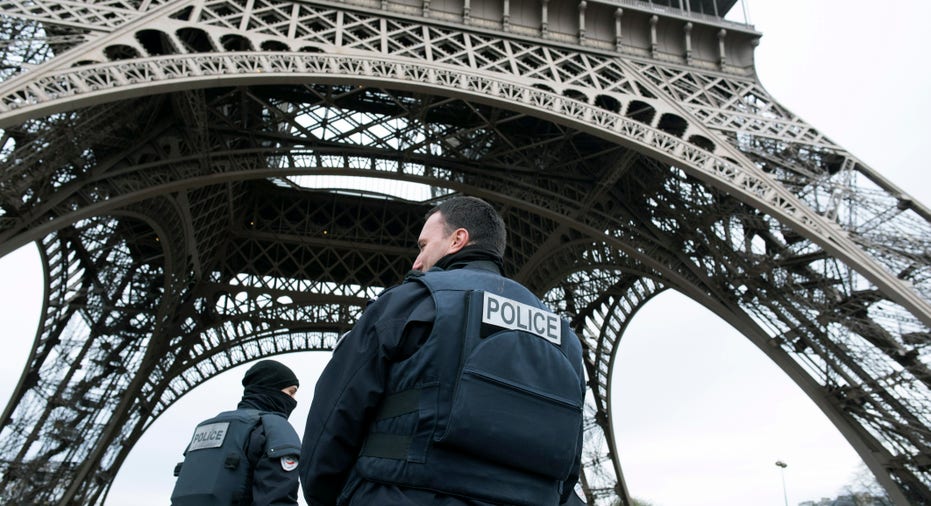Steep Drop For Tourism In Paris

Paris lit up for the holidays is a dream destination, a bucket-list experience for many. But this year terrorism fears have altered travel around the world. Airline tickets to Paris and other parts of Europe have been canceled in droves. Hotel prices have plunged after the Nov. 13 terrorist attacks in Paris. Expedia, the largest online travel booking company, has seen "super high" cancellation rates for Paris, all of France and all across Europe since the attacks, says Aman Bhutani, president of the Brand Expedia Group. There's been a decline in people going to Europe, as well as a drop in travel within Europe. Lufthansa says it has seen noticeable impact on Paris and Brussels and occasional longer security lines because of tighter passport controls. Air France says it lost $55 million (50 million euros) in revenue off cancellations in November alone. The Paris Convention and Visitors Bureau reported "mass cancellations" immediately after the attacks and bookings down 13% for the Christmas holiday period compared with last year. For a Christmas weekend stay, the Sofitel Paris Arc de Triomphe is only $288 a night. The five-star luxury hotel near the Champs Elysees has had a year-long renovation and usually costs at least twice as much. Current price for a June weekend next summer: $791 per night. "Paris for us has gone from being a very strong contributor to a business that's shrinking," says Dara Khosrowshahi, Expedia's chief executive. With the strong dollar and stable economy, trans-Atlantic travel had been surging. Even after the Charlie Hebdo attack, Expedia saw the number of Paris bookings jump 30% to 35% in 2015. But bookings declined 40% to 45% after the November attacks. Terrorism hits tourism quickly and deeply, but popular destinations usually recover rapidly. Paris is already starting to show signs of recovery, travel companies say. But some worry the recent round of ISIS attacks may have a more-lasting impact because of concerns of a broader campaign of terror versus isolated incidents of the past. People will still travel, but they will opt for trips to island beaches or domestic destinations instead of international trips. Paris is one of the top five travel destinations in the world and many saving up to see the City of Light will simply postpone travel. A Paris slowdown could have broad impact for reduced travel. Companies say it's too early to tell whether summer travel will feel a terrorism slowdown -- most of those reservations start booking in January. "When Paris hurts, the whole world hurts," Mr. Bhutani says. Most airlines and hotels waived cancellation penalties and offered to refund trips to Paris shortly after the attacks. That's become standard practice with snowstorms, hurricanes and other weather events, as well as terrorist attacks. Another confidence-building move that will keep people traveling: Hotels will have to up security and tighten access, Mr. Khosrowshahi says. Expedia says it has actually boosted spending on advertisements and promotions for Paris. "Just by traveling to Paris, the world can make a statement," Mr. Bhutani says. The World Travel and Tourism Council, based in London, says its research shows average recovery time for tourism after terrorist attacks is 13 months. That's quicker than recovery from a disease crisis, environmental disaster or political turmoil, all of which average more than 21 months before full recovery in tourism activity. "We expect Paris to return quickly to normal visitor levels," the WTTC said in a statement. Travel insurance companies say they see the biggest surge in calls about policies and sales of policies for future trips since the Sept. 11 attacks in 2001. InsureMyTrip says queries are up 20% after the combination of the suspected bombing of an airliner leaving Egypt and the Paris attacks. Buying travel insurance can ease anxiety for travelers in turbulent times. Terrorism coverage, however, is often limited in standard policies to 30 days after an attack. And you're covered only if the attack is in the country you're visiting. Many people who buy policies are surprised to learn that the policy doesn't help if they want to cancel their trip to Rome because of the Paris attacks. "One of our greatest challenges is awareness of the product," says Jeff Rutledge, chief executive of AIG Travel Insurance Inc. "It's very, very important that people look at the policy and understand it." One way to get broader coverage is to buy a "cancel for any reason" policy. Those policies are more expensive and cover only about 70% of actual losses, but work well for skittish travelers who may not want to go to London because of trouble in Paris. InsureMyTrip chief executive Jim Grace also recommends "interruption for any reason" protection -- those policies will pay to get you home if there's another attack anywhere, while standard policies would only be useful if the attack was in a country on your itinerary.
(END) Dow Jones Newswires



















